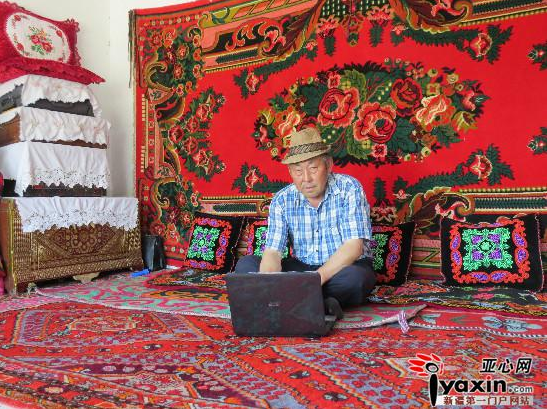|
 |
|
Hali surfs the Internet at home. [Photo/iyaxin.com] |
The best thing to happen to Hali Bag this year was his nephew Hayi Nar being accepted by Fudan University, one of the top seats of learning in China.
Hali, 61, from the Kazak ethnic group, is a retired middle school teacher from Qitai county in Xinjiang Uygur autonomous region. "Thanks to the computer classroom in his school, Hayi can stay informed and improve his way of thinking," said Hali.
Today, conditions in school are little different from those in urban areas. But when Hali was young, things were poles apart.
Hali was born in 1954. When he first went to school, he and other students had to cross a canal and walk at least three kilometers.
In the summer when the canal entered its flood season, the only two teachers would carry the students by riding a horse across the canal. Each teacher could take three students at a time.
After arriving at school, study was another challenge. Desks and chairs were cut from coarse timber. The students of four grades shared one classroom divided by boards. It was a tough task for the two teachers. After just one-day's work the teachers could not talk anymore.
Hali and his friends could not concentrate on studying.
At the time, Kazak people lived nomadic lives.
"Once the nomads stopped moving, the children got together to listen to their teachers on horseback," Hali said. "This is the traditional custom of Kazak people—'school on horseback'."
In 1982, Hali returned to his hometown after graduating from a secondary normal university.
Without any desks or chairs, Hali and his colleagues decided to collect mud and cement, building supplies for students.
"The desks and chairs were cool in the summer. But in winter, they turned the classroom into an icehouse," said Hali.
Winter in Xinjiang was especially frigid. The classroom had only one stove and students would stomp their feet on the ground to keep warm.
During snowy days, students easily fell down on the ice. Donkeys were freezing to death. Humans were freezing to death. A lack of proper protection caused many students to drop out.
Improvement came in 1984, when rural areas around the country began reforms. The adobe houses were replaced by brick ones. Proper desks and chairs were also put into use.
In the following a couple of years, a new heating system, library and lab were built. With the introduction of digital devices and video, students became more engaged in studying.
In 2010, after the Xinjiang Work Seminar was held by the State Council, the conditions in Hali's school took a big step forward.
The number of computers in the teaching buildings increased. The Internet helped keep students informed. They could study both the Uygur and Mandarin language, which greatly broadened their knowledge.
The living standards of Kazak people also improved. Due to the residence built under the assistance of local governments, Kazak people finally settled down.
As the automobile became popular they didn't need to worry about bad weather any more. The Kazak people, once known for being "on the horseback" would bid a farewell to the horse.
Like others, Hali bought a computer. "Although I'm retired, I like learning about news outside China," Hali said.
From 1954 to 2015, Kazak students moved from the learning on horseback to a modern classroom. Hali has experienced dramatic changes in the past few decades.
Since he retired, Hali spends most of his time learning something new on the Internet. "The changes here are an epitome of Xinjiang, and I hope I can make more of a contribution to the development of this place," he said.